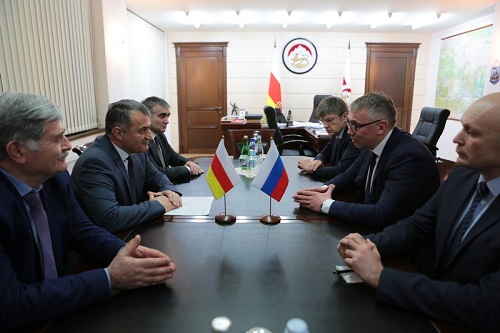
Russian Deputy Minister for North Caucasus Igor Koshin (middle in the right row) with Tskhinvali leader Anatoly Bibilov, February 8, 2018. Photo: presidentruo.org
February 5-11
1 644 Abkhaz, S.Ossetians treated in Georgian hospitals – Putin signs Tskhinvali military agreement – Additional electoral precincts for Putin’s election in March – Luhansk and Tskhinvali want “common information space” – New occupied point man visits Tskhinvali – Tskhinvali-Vladivostok relations – Drills in Abkhazia – U.S. congressmen express support for Georgia.
1 644 residents of the ccupied regions treated in Georgian hospitals in 2017: 1 644 persons residing in the occupied regions of Abkhazia and Tskhinvali Region/South Ossetia received free Georgian government-funded medical treatment in the Tbilisi-controlled part of the country during 2017. Of them, 1 137 (including 179 children) treated individuals reside in Abkhazia, while the other 507 (including 57 children) – in Tskhinvali Region. The overall cost of the Georgian government’s free treatment program for 2017 stood at GEL 4.28 million.
The State Program for Referral Services, introduced by the government in 2010, is available for residents of the two occupied regions who do not have Georgian passports and identity cards, and covers the patients’ full medical services in hospitals in the Tbilisi-controlled territory, as well as their transportation in emergency situations.
Russia’s Network – Putin signs Tskhinvali military agreement: On February 5, Russian President Vladimir Putin signed the agreement with the Russian-backed authorities in Tskhinvali Region “on the procedure of inclusion of separate units of the armed forces of the republic of South Ossetia into the armed forces of the Russian Federation.” The agreement had been ratified by the Russian Duma on January 24 and by the Federation Council on January 31.
Russia’s Network – Additional electoral precincts for Putin’s election in March: Russia is increasing the number of polling stations in Abkhazia and Tskhinvali Region/South Ossetia for Putin’s presidential re-election to be held on March 18. Moscow is assisted by the Russian-backed authorities in both regions during preparations for the election. While originally it had been announced there would be 16 polling stations in Abkhazia and nine in Tskhinvali Region, now the numbers have been increased to 19 and 10 respectively.
Russia’s Network – LNR and Tskhinvali want “common information space”: The Russian proxies in Ukraine’s Luhansk and Georgia’s Tskhinvali regions “will launch the work to create a common information space.” The intention, they say, is to break through the “information blockade.” An official from the Russian-backed Luhansk authorities Yuri Pershikov said the two regions had a lot in common: “Just like South Ossetia is fighting for the right to be within Russia… so are we trying to unite with our historical Motherland, because we are a part of the Russian world.”
Russia’s Network – New occupied regions point man visits Tskhinvali: Newly appointed Russian Deputy Minister for the North Caucasus, and the former governor of Russia’s Arctic region of Nenets Autonomous Okrug, Igor Koshin, visited Tskhinvali last week, discussing with the local Russian-backed leader Anatoly Bibilov Moscow’s “investment program” in the region. Koshin had been appointed to be the point man for Georgia’s two occupied territories in the Russian Ministry for North Caucasus.
Russia’s Network – Tskhinvali-Vladivostok relations: Tskhinvali “foreign minister” Dmitry Medoev visited the city of Vladivostok in the Russian Far East region, meeting with the local mayor and talking about cooperation between the city and the Russian-backed authorities in Tskhinvali Region.
The Military Aspect – Drills in Abkhazia: Russian troops based in Abkhazia continue their exercises season, with some drills including about a thousand troops and 200 military vehicles.
Western Voices – U.S. congressmen express support for Georgia: During Georgian parliamentary speaker Irakli Kobakhidze’s visit to the U.S., American congressmen expressed their solidarity with Georgia. Democrat David E. Price said Georgia was “in a very tough environment, in a neighborhood full of autocratic states, and with a neighbor that has occupied a fourth of the country and is constantly voicing threats and intimidation,” adding that Georgians had “admirable wish for self-determination.”
Republican Ted Poe also said Georgia was “in a rough neighborhood,” with the “Russian bear,” led by “the Napoleon of Siberia” Vladimir Putin trying to retake over the former parts of the Soviet Union. He added that Putin chose Georgia first to invade “because Georgia was and still is the strongest democracy in the region,” and because, in Putin’s opinion, “if he can break Georgia, he can break the other former Soviet republics.”
